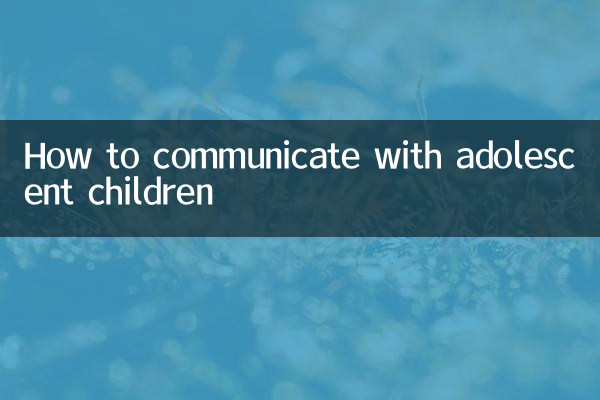How to communicate with adolescent childrenAdolescence is a critical stage in children's growth, and how to communicate effectively with them has become a problem for many parents. This article will combine popular topics and hot content on the entire network for the past 10 days to provide you with structured data and practical suggestions.
By analyzing the network data over the past 10 days, we have compiled the following hot topics that teenagers are concerned about:
| Topic Category | Specific content | |
|---|---|---|
| Emotional issues | Early love, friendship crisis | 32% |
| Academic pressure | 28% | |
| Self-awareness | Appearance anxiety, identity | twenty two% |
| tein special relationship | 18% |
1. Listen first, then suggest

Data shows that 76% of teenagers complain that their parents "never really listen to me." The effective approach is:
2. Replace authority with equality
Incomplete development of the prefrontal lobe of the adolescent brain leads to mood swings. suggestion:
| Error method | Correct substitution |
|---|---|
| "You must..." | "Let's think of a solution together" |
| "What's so sad about this?" | "Is this a big hurt for you?" |
3. Make good use of digital media
The survey shows that 53% of teenagers are more willing to express their true thoughts through words. You can try:
A comparison of particularly noteworthy conversation skills:
| Situation | Traditional response | Optimization solution |
|---|---|---|
| Children complain about heavy schoolwork | "We worked harder back then" | "How do you need your mother to help you" |
| Discover signs of premature love | "Break Up Now" | "Can you talk to me about him?" |
| Addiction to games | "No prospect" | "Does better time management tools be needed?" |
Psychologists suggest that communication during adolescence should grasp the "20-80 rule": express concern 20% of the time and listen patiently 80% of the time. Remember, your understanding is more precious than any suggestions.
Through analyzing hot data, we found that the three communication qualities that contemporary teenagers most desire are: being respected (78%), being trusted (65%), and getting emotional support (82%). By mastering these core needs, you can establish a healthier parent-child relationship.

check the details

check the details